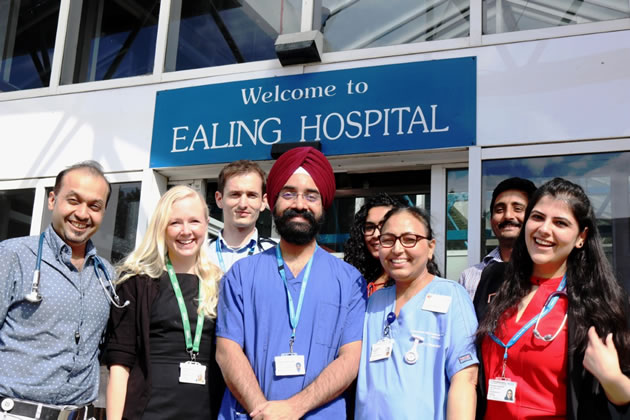Ealing Doctor on Fighting the War Against Coronavirus
Dr Harmandeep Singh returns to work after suffering from the disease

Last month Dr Harmandeep Singh was suffering from extreme tiredness, fever, and struggling to walk up one flight of stairs, but now he is on the front line at Ealing Hospital fighting the “war” against coronavirus.
The cardiologist working at the Southall-based hospital overcame a 10 to 12 day spell of Covid-19 with his wife, which ranged from a high heart rate to no energy and breathing difficulties.
But the first step the couple made in recognising their symptoms was to shut themselves out of all social media to stop themselves becoming more stressed and anxious about their condition, which could impact the way their body reacted to the virus.
And as a doctor with 12 years in the profession, Dr Singh also ensured they were monitoring each other’s breathing as a priority, which they did through their speech.
“Can she talk in full sentences, can I talk in full sentences or not? That was the only thing we monitored at home. Because that’s a sign,” he explained.
“If you can’t talk in full sentences that’s when your lungs are being affected, that’s the time you need to seek medical help.”
The father-of-two tracked his illness finding that after the first four days of body aches, persistent temperature and breathing difficulties, day five felt as if “nothing had happened” for a couple of days. But then day eight was a “sudden deterioration again”.
On day 12 he said: “I was perfectly fine, back to normal.”
He added: “That does reflect with patients that we are seeing, sudden deterioration or sudden improvement in 24 hours.”
Now at the hospital, Ealing’s hub has been divided into two sections of coronavirus and non-coronavirus centres, with little movement of staff between them.
NHS staff call families of loved ones on the wards each day to update them on their progress, but the volatile nature of the disease means things can change rapidly.
Dr Singh said: “As a healthcare professional, and I think most of my colleagues will agree with me, that it has been emotionally challenging for us. We are seeing what the general public is not seeing, the other side of coronavirus, the worst side of coronavirus…
“People really do not understand the severity of the disease. I know most people will get a mild disease and get over it. But for those who are getting severe disease it can be life changing for the families and it is extremely hard for us to see that suffering in those patients as well.”
To keep morale up, the staff discuss positive progress each morning and look at the number of patients they have been able to discharge, and Dr Singh says he feels very proud of how the hospital staff on all levels have responded to the challenge.
Thank you flags put up near the hospital, cards from children and the general public as well as “enormous” amounts of food from local businesses, have also brightened the spirits of hospital staff, making them feel valued.
London North West University Healthcare NHS Trust, which manages Ealing Hospital, has registered one of the highest number of coronavirus deaths in England, however Dr Singh reveals there is more positivity behind the headline figures.
For example he recalls discharging a 99-year-old, who he had previously believed was “about to die” but then “recovered completely”.
The 36-year-old added: “We’ve had people in their 90s who we thought were at the end of their lives and will not make it, we made the phone calls, explained to the families, and three days later they were at home. So it’s not all bad, we’ve had good success in sending people home.”
“I came back from not being able to climb one flight of stairs to being able to doing perfectly normal work within three days…If someone does contract the virus, it’s not the end of the road.”
But another take away Dr Singh wants the public to know is that social distancing is the most important action to take in this “wartime” effort, and to ensure the best possible defence against the disease.
“What we are fighting is a virus, something that we don’t know about, something that we can’t even see, something we don’t know how it’s going to react when it gets into your body…there is no cure, no vaccination,” he said.
“So the only way to contain this virus is to stay away from each other and not pass it on.”
He added: “This essentially is a war, it’s what we are in, so people need to understand and take it seriously. The NHS is up for the fight, but what the NHS really needs from the general public is they need to stay indoors.
“Not going out for a month is not going to do any harm to your health…but it will make a massive difference in terms of this Covid crisis.”
And he said: “Social distancing, seriously stay at home. That is the key.”
Anahita Hossein-Pour - Local Democracy Reporter
April 9, 2020